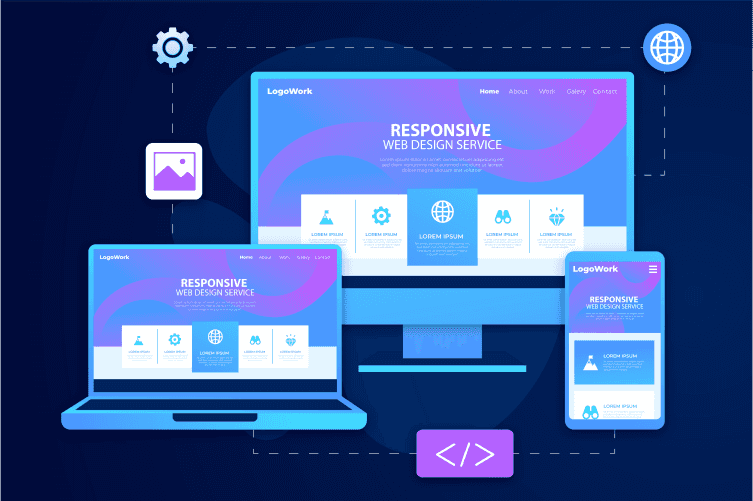In the rapidly evolving landscape of mobile app development, the choice of framework plays a pivotal role in shaping the success of a project.
Among the array of options, React Native mobile app development has emerged as a frontrunner, garnering widespread acclaim for its unique set of advantages.
We, as a React Native development company, want to delve into the compelling reasons and share our own experience on why businesses and developers alike are opting for React Native when crafting innovative and efficient mobile applications.
What is React Native?
To understand why businesses need to choose React Native for Mobile app development we need to understand what React Native is. It is an open-source framework developed by Facebook for building mobile applications using JavaScript and React.
Released in 2015, React Native has gained widespread popularity for its ability to enable the development of cross-platform mobile apps with a single codebase. This means that developers providing React Native app development services, can write code once and deploy it on both iOS and Android platforms, streamlining the development process and making it more efficient.
The framework leverages React, a JavaScript library for building user interfaces, and extends its capabilities to mobile app development. React Native allows developers to create a native-like user experience by using native components, ensuring that the final app performs seamlessly and is indistinguishable from apps built using traditional native development methods.
One of the key advantages of React Native is its "Hot Reload" feature, which allows developers to see the real-time results of code changes without the need to rebuild the entire application.
This feature accelerates the development cycle, making it easier to experiment with and fine-tune the app's user interface and functionality.
React Native mobile development has been adopted by a wide range of companies and developers for its efficiency, flexibility, and cost-effectiveness.
It has become a go-to choice for businesses aiming to create high-quality, cross-platform mobile applications while maximizing code reuse and minimizing development time and costs.
Click the link if you want to learn more about React Native & cross platform mobile app development.
Benefits of React Native for Mobile App Development
In the ever-evolving landscape of mobile app development, React Native has emerged as a transformative force, offering a bunch of benefits that have reshaped the way applications are crafted.
Below we want to share the distinctive advantages that make React Native a preferred choice for cross platform mobile app development.
From its cross-platform prowess and code reusability to native-like performance and a thriving developer community, we show how React Native streamlines the development process, enhances user experiences, and delivers unparalleled efficiency in the dynamic world of cross platform mobile app creation.
Cross-Platform Development in the Current Mobile App Landscape
In the dynamic landscape of mobile app development, the pivotal role of cross-platform mobile app development cannot be overstated. React Native, an influential open-source framework, emerges as a robust solution to address this imperative need.
By enabling developers to craft applications that seamlessly transcend both iOS and Android platforms, React Native not only simplifies the development workflow but also guarantees an expansive reach. This capability to operate uniformly across diverse devices enhances user experiences, fostering a consistent and reliable interaction regardless of the chosen platform.
In a world where users engage with applications on a myriad of devices, React Native's cross-platform prowess ensures a streamlined approach to development.
The framework's ability to transcend platform boundaries not only saves valuable development time but also positions applications for a broader market presence.
React Native, thus, stands as a catalyst in reshaping the mobile app landscape, where adaptability and efficiency are paramount.

Code Reusability in React Native
Central to React Native's allure is its commitment to code reusability. This fundamental principle empowers developers to create a single codebase that seamlessly operates across both iOS and Android platforms.
The result is not only a consistent user experience but also a substantial reduction in development time and effort. The efficiency derived from code reusability becomes a pivotal advantage, enabling developers to channel their energy into enhancing features rather than grappling with the complexities of managing disparate codebases.
In the intricate landscape of cross platform mobile app development, the ability to reuse code proves transformative. React Native's approach not only streamlines the mobile app cross platform development process but also fortifies the application's foundation with a unified codebase.
This unity not only simplifies maintenance but also diminishes the likelihood of inconsistencies between platforms. In essence, React Native's commitment to code reusability stands as a linchpin in elevating the developer experience, fostering efficiency, and ultimately delivering robust, feature-rich applications.
Native Performance
React Native defies prevalent misconceptions surrounding cross-platform frameworks by excelling in the delivery of near-native performance. Its prowess in this domain is attributed to the innovative bridge architecture, a key component that facilitates seamless communication between JavaScript code and native modules.
This distinctive architectural approach ensures that React Native applications inherit the responsiveness and speed synonymous with those developed using traditional native methods.
The bridge architecture serves as a vital mediator, enabling the efficient execution of code while maintaining a high level of performance. Consequently, React Native app development services provide a user experience that is indistinguishable from fully native applications, debunking the notion that cross-platform frameworks compromise on performance.
In a landscape where speed and responsiveness are paramount, React Native emerges as a powerful solution for developers seeking to harness the efficiency of cross-platform development without sacrificing the native performance expected by users. This unique blend of versatility and high performance positions React Native as a formidable player in the cross-platform mobile app development arena.
Hot Reload Feature
Revolutionizing the mobile app development journey, React Native introduces the transformative Hot Reload feature.
This innovative capability allows developers to experience real-time results of code changes without the cumbersome requirement to rebuild the entire application.
By eliminating the need for time-consuming rebuilds, the Hot Reload feature becomes a catalyst for expediting the debugging and testing phases of React Native mobile development.
This dynamic functionality encourages a more iterative and responsive approach to coding, amplifying productivity along the way. Developers can instantaneously witness the impact of their code modifications, facilitating quicker adjustments and fine-tuning.
This not only streamlines the React Native mobile app development workflow but also empowers developers to experiment with different solutions, fostering a more agile and efficient coding process.
In a landscape where agility and responsiveness are key, React Native's Hot Reload stands as a testament to the framework's commitment to enhancing the developer experience.
It exemplifies a forward-thinking approach that not only saves valuable time during React Native mobile development but also promotes a more dynamic and collaborative coding environment.
Large Developer Community
Beyond its technical capabilities, React Native's strength lies in its expansive and vibrant developer community. This thriving collective provides a wealth of advantages, offering continuous support, a rich repository of resources, and an extensive array of third-party plugins and libraries.
Developers navigating the React Native ecosystem find themselves in a collaborative environment where troubleshooting is not a solitary endeavor but a collective effort.
The active community ensures that developers have access to a diverse set of perspectives and insights, facilitating a dynamic exchange of knowledge.
This communal support system becomes invaluable when encountering challenges or seeking innovative solutions. Additionally, the vast pool of third-party plugins and libraries contributes to the framework's versatility, allowing developers to enhance their projects with pre-built components and functionalities.
Staying connected within this dynamic ecosystem not only aids in problem-solving but also serves as a conduit for staying abreast of the latest trends and best practices in cross platform mobile app development.
React Native's large developer community thus becomes a cornerstone, fostering an environment where knowledge flows freely, collaboration thrives, and developers can collectively push the boundaries of what is achievable in cross-platform mobile app development.

Cost-Effectiveness
The cost-effectiveness of React Native app development services stems from its intrinsic emphasis on code reusability, presenting a compelling advantage for businesses.
With the ability to utilize a single codebase across both iOS and Android platforms, React Native development services significantly reduce costs and resource requirements.
This streamlined approach not only minimizes the complexities associated with managing separate codebases but also optimizes the allocation of development resources.
The appeal of React Native lies in its capacity to deliver a consistent and high-quality user experience while maximizing efficiency, ultimately leading to substantial savings.
Businesses adopting React Native can achieve a broad market presence without the need for extensive financial investments in multiple development teams or prolonged cross platform mobile app development timelines.
In a landscape where cost considerations play a pivotal role in decision-making, React Native's cost-effectiveness positions it as an attractive choice for businesses of varying scales.
This framework not only aligns with budgetary constraints but also empowers companies to channel their financial resources strategically, ensuring a robust and cost-efficient approach to cross platform mobile app development.
Popular Apps Built with React Native
React Native stands as a testament to its capabilities through the deployment of popular and high-impact applications across various industries.
Industry giants such as Facebook and Instagram, which demand seamless performance and vast user engagement, have chosen React Native to power their mobile experiences.
These global platforms serve as living proof of React Native's adaptability and capacity to handle high-traffic applications with finesse.
Beyond social media behemoths, React Native app development services had found a place in the diverse landscape of applications, including the renowned lodging marketplace Airbnb.
The success stories of these widely-used apps underscore React Native's versatility and its ability to cater to the intricate requirements of diverse industries.
These case studies not only validate React Native's technical prowess but also showcase its robustness in real-world scenarios.
The framework's capacity to meet the demands of applications with varying complexities and user bases positions it as a reliable choice for developers and businesses alike, further solidifying its reputation in the realm of mobile app cross platform development.
Limitations and Considerations
While React Native stands as a powerful solution for cross-platform mobile app development, a nuanced evaluation must acknowledge its limitations.
Projects with highly specialized requirements or intricate animations might find native development more suitable, as the flexibility and precision offered by native languages can be advantageous in such contexts. React Native, although robust, may encounter challenges in replicating the intricacies of certain native functionalities.
Resource-intensive applications, particularly those demanding high computational power, may face hurdles in achieving optimal performance through React Native mobile app development.
In scenarios where milliseconds matter or when the app requires intensive hardware interaction, native development could be a more appropriate choice.
Assessing project needs comprehensively becomes imperative in deciding when React Native mobile app development might not be the optimal solution. Factors like project complexity, performance requirements, and the need for highly specialized features should guide this decision-making process.
By carefully weighing these considerations, developers can make informed choices, selecting the development approach that aligns most seamlessly with the unique demands of the project at hand.
Why Choose React Native for Mobile App Development?
Choosing React Native for mobile app development provides numerous advantages that cater to modern development needs. Here's a comprehensive overview of why React Native stands out in the realm of mobile application development.
React Native app development services are renowned for its cross-platform capabilities, allowing developers to create applications that seamlessly run on both iOS and Android platforms.
This singular codebase approach significantly reduces development time and effort, enabling businesses to reach a wider audience efficiently.
A standout feature of React Native mobile app development is its emphasis on code reusability. Developers can write a substantial portion of the code once and apply it across different platforms, promoting consistency and diminishing the likelihood of bugs.
This streamlined development process enhances efficiency and reduces the overall workload.
React Native achieves near-native performance by utilizing a bridge architecture to facilitate communication between JavaScript code and native modules. This ensures that the developed applications deliver a smooth, responsive, and high-performance user experience akin to fully native apps.
The Hot Reload feature in React Native empowers developers to witness real-time results of code changes instantly, without having to rebuild the entire application.
This not only accelerates the React Native for mobile app development process but also facilitates a more dynamic and iterative approach to coding.
React Native's inherent support for code reusability and mobile app development cross platform translates into substantial cost savings for businesses.
With a unified codebase catering to both iOS and Android, companies can achieve broader market reach without the need for separate development teams, ultimately reducing development costs.
React Native boasts a thriving and expansive developer community. This not only fosters a collaborative environment but also ensures continuous support, access to a wealth of resources, and a plethora of third-party plugins.
Developers can leverage this vibrant community to troubleshoot issues, share insights, and stay updated on the latest trends in mobile app development.
Numerous success stories underscore React Native's capability to handle diverse and high-traffic applications. Industry giants such as Facebook, Instagram, and Airbnb have successfully utilized React Native to create feature-rich, user-friendly applications, showcasing the framework's adaptability and scalability.
React Native app development is well-suited for projects of varying scales, making it an ideal choice for startups and enterprises alike.
Its flexibility allows businesses to tailor their mobile applications according to specific needs, ensuring an adaptive and innovative approach to development.
React Native emerges as a powerhouse in mobile app development, offering a harmonious blend of cross-platform efficiency, code reusability, native-like performance, and a supportive community.
This framework not only simplifies the development journey but also aligns with the dynamic needs of businesses aiming for a strong and versatile mobile presence.

FAQ's
1. What is React Native, and how does it differ from other mobile app development frameworks?
React Native is an open-source framework developed by Facebook for building mobile apps using JavaScript and React. Unlike traditional frameworks, React Native allows for cross-platform mobile app development, reducing the need for separate codebases for iOS and Android.
2. Why is cross-platform development important, and how does React Native facilitate it?
Cross platform mobile app development is crucial to reach a broader audience efficiently. React Native enables this by allowing developers to write code once and use it on both iOS and Android platforms, saving time and resources.
3. How does React Native ensure native-like performance in mobile apps?
React Native achieves native-like performance through its bridge architecture, which enables seamless communication between JavaScript code and native modules. This ensures smooth and efficient app performance on both platforms.
4. What is the Hot Reload feature, and how does it benefit developers?
The Hot Reload feature allows developers to see the real-time results of code changes instantly, without rebuilding the entire app. This enhances productivity by reducing development time and making the debugging process more efficient, which helps to make the process of providing React Native app development services easier.
5. Can you elaborate on the cost-effectiveness of using React Native for mobile app development?
React Native's code reusability significantly reduces development costs by allowing developers to use a single codebase for both iOS and Android platforms. This not only saves time but also minimizes the resources required for maintaining separate codebases.
Check our article on how much does it costs to develop an app here.
6. Are there any limitations or considerations when opting for React Native?
While React Native for mobile app development offers numerous advantages, it's essential to consider factors like app complexity and specific platform requirements. In some cases, native development might be more suitable.
7. Can you provide examples of popular apps built with React Native?
Yes, several well-known apps have been successfully developed using React Native application development services, including Facebook, Instagram, and Airbnb. These success stories highlight the framework's capability to handle diverse and high-traffic applications. You can check our portfolio for more real life examples of projects that we developed at Uran.
Relevant Articles:













































